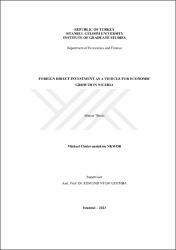Foreign direct investment as a vehicle for economic growth in Nigeria
Özet
Bu araştırma çalışması, Nijerya'da doğrudan yabancı yatırımların ekonomik büyüme ile ilişkisinin ampirik gerekçesini araştırmayı amaçlamıştır. Çalışma, çalışmanın açıklayıcı değişkenleri olarak brüt sermaye oluşumu (GCF), 14-65 yaş arası nüfus tarafından temsil edilen işgücü ve doğrudan yabancı yatırım (FDI) ve GSYİH büyümesi (yıllık; %) ile 1972-2020 yılları arasında değişen zaman serisi verilerini kullandı.) çalışmanın yanıt değişkeni olarak. Nijerya'da değişkenler arasında eşbütünleşmenin varlığını tespit etmek, kısa ve uzun dönem katsayılarını tahmin etmek ve bunların bireysel etkilerinin ekonomik büyüme üzerindeki önemini kontrol etmek için Otoregresif dağılım gecikmesi (ARDL) tahmin tekniği kullanılmıştır. Bulgular, DYY'nin uzun vadede ekonomik büyüme üzerinde pozitif ve anlamlı bir etkiye sahip olduğunu, ancak kısa vadede negatif ve önemsiz bir etkiye sahip olduğunu göstermiştir. GCF'nin ekonomik büyüme üzerinde yalnızca kısa vadede pozitif anlamlı bir etkiye sahip olduğu, ancak uzun vadede pozitif etkisinin önemsiz olduğu görülmüştür. Emeğin Nijerya'da hem kısa vadede hem de uzun vadede ekonomik büyüme üzerinde olumlu ve önemli bir etkiye sahip olduğu görüldü. Değişkenler arasında nedensellik ilişkilerinin olup olmadığını araştırmak için VAR Granger nedensellik testi kullanılmış ve sonuçlar DYY ile ekonomik büyüme, işgücü ve ekonomik büyüme, ekonomik büyüme ile GCF ve DYY ile işgücü arasında tek yönlü nedenselliğin varlığını göstermiştir. Ancak, DYY ile GCF arasında çift yönlü bir nedensellik ilişkisi görülmüştür. Nijerya'da ekonomik büyüme üzerinde GCF, işgücü ve DYY'nin önemli ölçüde etkili olduğu sonucuna varılmıştır. This research study aimed to investigate the empirical justification for foreign direct investments' relationship with economic growth in Nigeria. The study utilized time series data ranging from 1972-2020, with gross capital formation (GCF), labor proxied by population aged 14-65, and foreign direct investment (FDI) as the explanatory variables of the study and GDP growth (annual; %) as the response variable of the study. The Autoregressive distributive lag (ARDL) estimation technique was employed to ascertain the presence of cointegration among the variables, to estimate the short-run and long -run coefficients and check for the significance of their individual impacts on economic growth in Nigeria. Findings showed FDI to have a positive and significant impact on economic growth on the long run, however it had negative and insignificant impact in the short run. GCF was seen to only have a positive significant impact on economic growth in the short run but its positive effect on the long run was insignificant. Labor was seen to have positive significant impact on economic growth in Nigeria both in the short run and on the long run. VAR Granger causality test was used to investigate the existence of causal relationships in among the variables and results showed the existence of unidirectional causality between FDI and economic growth, labor and economic growth, economic growth and GCF as well as FDI and labor. However, a bi-directional causal relationship was seen between FDI and GCF. It was concluded that GCF, labor and FDI are significantly influential to economic growth in Nigeria.
Bağlantı
https://hdl.handle.net/11363/4673Koleksiyonlar
- Yüksek Lisans Tezleri [1219]
Aşağıdaki lisans dosyası bu öğe ile ilişkilidir:


















